 December,
2019. One of
our students,
Cleopas
Njerekai, has
recently had
two significant
publications by Taylor and
Francis Group.
The first is a chapter entitled
“The context and future of
tourism in Africa’s national
parks: Could privatization
within protected areas be the
panacea?” in the book edited
by Monkgogi L., Naomi
Moswete and Moren Stone,
Natural resources, tourism
and community livelihoods in
Southern Africa: Challenges
of Sustainable Development,
London, Routledge (2019).
Find it here:
The second is the article
“An application of the virtual
reality 3600 concept to the
Great Zimbabwe Monument,”
published in the Journal of
Heritage Tourism, London,
Taylor and Francis (2019).
Find it here:
Cleopas Njerekai has taught
more than 30 tourism and
hospitality management modules
at different universities in
Zimbabwe and in the diaspora.
Currently, he is studying a
PhD in Tourism at AIU.
December,
2019. One of
our students,
Cleopas
Njerekai, has
recently had
two significant
publications by Taylor and
Francis Group.
The first is a chapter entitled
“The context and future of
tourism in Africa’s national
parks: Could privatization
within protected areas be the
panacea?” in the book edited
by Monkgogi L., Naomi
Moswete and Moren Stone,
Natural resources, tourism
and community livelihoods in
Southern Africa: Challenges
of Sustainable Development,
London, Routledge (2019).
Find it here:
The second is the article
“An application of the virtual
reality 3600 concept to the
Great Zimbabwe Monument,”
published in the Journal of
Heritage Tourism, London,
Taylor and Francis (2019).
Find it here:
Cleopas Njerekai has taught
more than 30 tourism and
hospitality management modules
at different universities in
Zimbabwe and in the diaspora.
Currently, he is studying a
PhD in Tourism at AIU.
 January 10,
2020. One of
our graduates,
Hassan Elsan
Mansaray, has
published a
book with Lambert Academic
Publishing based on the PhD
thesis that he submitted at
AIU: “The Impact of Mining
in the Local Communities in
Sierra Leone.”
The book is about the
views of the local communities
in Tankoro, Imperi and
Marampa, chiefdoms regarding
socioeconomic conditions,
environmental and mining
operational effects of these
local communities.
You can find his book
in MoreBooks!:
Find it here:
Hassan Elsan Mansaray has
completed a Doctorate program
in International Management
at Atlantic International
University.
January 10,
2020. One of
our graduates,
Hassan Elsan
Mansaray, has
published a
book with Lambert Academic
Publishing based on the PhD
thesis that he submitted at
AIU: “The Impact of Mining
in the Local Communities in
Sierra Leone.”
The book is about the
views of the local communities
in Tankoro, Imperi and
Marampa, chiefdoms regarding
socioeconomic conditions,
environmental and mining
operational effects of these
local communities.
You can find his book
in MoreBooks!:
Find it here:
Hassan Elsan Mansaray has
completed a Doctorate program
in International Management
at Atlantic International
University.
 December
30, 2019. One
of our graduates,
Dr. Carlos
Rossi, has
just participated
as an
exhibitor at the World Summit
on Emotional Intelligence in
Mexico, in January 2020, with
the theme “The EQ of The
Negotiators”. Specialists from
various countries around the
world, and from all continents,
participated in this event.
The World Summit, Mexico
2020 offers three days to connect
with yourself, and with
others; sharing the vision of
the best emotional intelligence
experts from more than 15
countries. Find more information
here: https://esp.6seconds.org
Dr. Carlos Rossi completed
a PhD in Education
and another PhD in Human
Resources at Atlantic International
University.
December
30, 2019. One
of our graduates,
Dr. Carlos
Rossi, has
just participated
as an
exhibitor at the World Summit
on Emotional Intelligence in
Mexico, in January 2020, with
the theme “The EQ of The
Negotiators”. Specialists from
various countries around the
world, and from all continents,
participated in this event.
The World Summit, Mexico
2020 offers three days to connect
with yourself, and with
others; sharing the vision of
the best emotional intelligence
experts from more than 15
countries. Find more information
here: https://esp.6seconds.org
Dr. Carlos Rossi completed
a PhD in Education
and another PhD in Human
Resources at Atlantic International
University.
 January, 2020.
This graduate student completed
the majority of the requirements
to obtain honors,
which included a 4.0 GPA,
published works, recommendation
from his advisors,
patent a product, etc.
Congratulations!
January, 2020.
This graduate student completed
the majority of the requirements
to obtain honors,
which included a 4.0 GPA,
published works, recommendation
from his advisors,
patent a product, etc.
Congratulations!

| Lucia Mignola Bachelor of English Language English as a Second Language Argentina |
Violeta Cuñado Bachelor of Science Psychology Argentina |
Benedito Jacinto Francisco Capita Bachelor of International Management International Management Belgium |
Claudia Alejandra Calderon Tapia Bachelor of Arts Digital Marketing Bolivia |
Boipelo Joyce Masinge Master of Education Research and Evaluation Botswana |
Norma Lina Scott Padilla Bachelor of Science Psychology Caym an Island |
| Jeanette Beatriz Acuña Rebolledo Bachelor of Science Nutrition and Dietetics Chile |
Ginna Mayerly Cárdenas Vargas Bachelor of Science Civil Engineering Colomb ia |
Max Sequeira Cascante Doctor of Philosophy Marketing and Advertising Costa Rica |
Armely Melissa Bonilla Rodríguez Master of Accounting Tax Accounting Dominican Republic |
Fredy Francisco Nadal Castellanos Master of Science Clinic Psychology Dominican Republic |
Mariano Montero Vallejo Bachelor of Political Science Human Resources Dominican Republic |
| Danilo Xavier Alvarado Solis Bachelor of Science Telecomm unications Engineering Ecuador |
Lorraine Rusike Pasipamire Master of Science Public Health Eswatini |
Luz Marina Urrego Mezgouht Bachelor of Education Social Pedagogy Germany |
Luis Ernesto Suy Mux Bachelor of Science Electrical Engineering Guatemala |
Andrea Aguilar Girón Bachelor of Science Comm unication Science Guatemala |
Ho Yin Ip Master of Science Inform ation Systems Hong Kong Special Administrative Region |
| Sanaa Khaled Doctor of Science Food Chemistry Lebanon |
Jonathan Y. Clinton Master of Science Educational Administration Liberia |
Armindo Vasco Mahawa Master of Public Health Comm unity Health Mozamb ique |
Niyi O. Taiwo Bachelor of Science Electrical Engineering Nigeria |
Asianuba Uchechukwu Sixtus Doctor of Philosophy Public Health Nigeria |
Oluwafemi Madojutimi Master of Science Comp uter Science Nigeria |
| Gbagu Ejiroghene Emmanuel Doctor of Science Accounting Nigeria |
Martha Maruja Ríos Ubide Master of International Relations International Relations Panama |
Liane Gail Regnard Bachelor of Science Education South Africa |
Michael Fitzgerald Alexander Bachelor of Science Renewable Energy St. Kitts and Nevis |
Okanda Collins Ambeno Bachelor of Education Education Taiwan |
Tonyi Kossi Noudjrodou Bachelor of Education Education Thailand |
| Lucian P Hodge Doctor of Science Electrical Engineering USA |
Mpanya Dikuyi Pascal Master of Business Administration Accounting USA |

 Suham Sarah
Suham Sarah
 Washington Menwo Dehfer Sr.
Washington Menwo Dehfer Sr.
 Mpho Chingapane
Mpho Chingapane

The development of a
country depends largely
on the quality and quantity
of projects implemented.
For most countries across
the world, one of the most
important projects where
the country can invest to
boost both the economy and
social is that of infrastructure.
Goeldner and Ritchie
(2003, p.15) deem that: “such
basic things as roads, sewage
systems, communication
networks, and many commercial
facilities (supermarkets
and retails stores) have been
put in place to meet the needs of local residents”. Roads
infrastructures for example
can boost the commerce and
other important activities such
as tourism. In the Democratic
Republic of Congo, a great deal
of these infrastructures have
been put in place by the Government
to cater for the needs
and wants of the population
but unfortunately there is
always a huge gap between intentions
and realizations; that
is some of them never came to
the end or never met the real
need of those people to whom
the projects have been initiated.
That is the case of the
dam’s projects in Central Kasaï
and Kwilu provinces. The
same with hotel project in the
province of Maï-Ndombe and
several other projects such as
that of raising electrical post
and Poids-lourd and By-Pass
Avenue at Kinshasa.
In the Democratic Republic
of Congo, the construction
of roads, railways, dams
and other infrastructures are
exclusively reserved to the
Government but unfortunately,
very often, these projects
are either inefficient either
ineffective that is, never came
to the end. Given that these
projects never come to the end
impedes the development of
the entire country and constitutes
the waste of money for
the country. In the province
of Maï-Ndombe as stated
earlier for example, after more
than 40 years this hotel is
unfinished. Nevertheless, the
exploitation of this superstructure
could be a chance for
this province to develop the
sector of tourism and impact
positively its economy that is
one of the less developed in
the country. By the years after
2006, the Government of the
Democratic Republic of Congo
took the decision to enlighten
two major avenues of Kinshasa:
Poids-lourd and By-Pass
but the Government made two
big mistakes: first the posts
where not high enough to
prevent robbers to steal cables,
for the first, and second the
posts were raising too close
of the road without taking in
count the future enlargement
of the roads. When needs
raised to enlarge the roads few
days later the posts had been dismantled. Risk management
could prevent this waste of
money, energy and time.
The money spent in the
construction could be invested
in other domains and
generate profit and employment.
As the main concern of
project manager and his team,
project owner and different
stakeholders is to achieve
the setting objectives and the
goals, failure could be avoid in
advance by establishing plan
for risk management. Unfortunately,
that is not always the
case and several major projects
often fail because of risks
that are inherent to any projects
have not been considered
in the first place. To avoid or
to mitigate these risks, sound
project managers know how
to face these uncertainties by
using for each project an appropriate
risks management.
Wise project managers
never accept to launching
a project without being
sure that contingency
plans are in place to face
uncertainties. Failure to this
mere principle of project management,
several projects in
Democratic Republic of Congo
never achieved their objectives
and goals. These series of
failures have impacted badly
the development of the country
and impeded the country
to exploit opportunities of the
development or of gaining its
economic autonomy. These
failures are exacerbated in the
Democratic Republic of Congo
these last decades because of
different reasons, and among
them; they are the inexperience
of project managers
of government projects and
non-implication of management.
To enhance the welfare
of Congolese and its economy,
the country needs to select
professionally projects and to
give their management on the
hands of sound project managers.
Across the globe, countries
rely on both: quality and
quantity of projects but this
fact it is not always the case
or accepted in Democratic Republic
of Congo and as results
of this, projects outcomes are
not always what were expected
by the main stakeholders.
Very often because the project
never came to their end or just
because agreements are not
met: projects are out of the
schedule, budget or under of
quality.
Failure of these major
projects have lead to waste of
money, lack of development
for the country, bad images
of Government, poverty etc.
Many failures of projects are
as stated earlier, the result of
the lack of risks identification
inherent to all projects
before the launching of project
activities or only because the
risks have not been managed properly. Failure to identification
of risks and adequate
management of project can be
associated to the inexperience
of project managers. Project
managers are nominated
not according to their
skills but according to
their relationship with
government members.
But also some degrees of project
management are in reality
fake diploma because their
curriculum never includes
main courses of project such
as risks management.
Despite these drastic failures,
the Democratic Republic
of Congo seems adopting
the same behavior and as a
consequence, the country is
not actually accomplishing
major projects of infrastructure
initiated and in which
huge amount of money was
spent. To avoid repetitions of
these failures that impact badly
the image of the Government
and the economy of the
country, Congolese Government
needs to include in projects
management team subject
matter experts that one of the
job missions be the identification
of risks, their management
and the preparation the
contingency reserve to face
them when occurring. For this,
Congolese government needs
to rely on local specialists that
unfortunately are not always
consulted during the selection
period of these megaprojects.
These assumptions are worth
to be retaining given that projects
for most of the countries
across the world are steered by
what Verzuh (2003) calls Accident
Project Manager (APM)
and The Democratic Republic
of Congo is not an exception.
Among megaprojects initiated
by the Government and that
have failed they are projects
related to the implementation
of dams at grand Bandundu
and grand Kasai, roads that
last only one or two semesters,
the Hôpital du Cinquantenaire
and the two avenues mentioned earlier. To achieve
the vision of being among
emergent countries by the year
2030, the Democratic Republic
of Congo needs to change its
way of managing projects or
die. That is, the Government
must first before launching
projects to understand what
qualify a project and risks
that are inherent to them.
Despite the fact that projects
are the best way to develop a
country and to get its economic
autonomy in the case
of the Democratic Republic of
Congo, one must know that
they are some preconditions
as for in certain circumstances
projects can become source
of impoverishment, that is
in case the project does not
achieve the objectives and
the goals for which it was set
up. The project of Hôpital du
Cinquantenaire for example
is not a success given that different
stakeholders have not
been satisfied both because of
the time it took before it becomes
operations more or less
forty years after the launching
and because of its management
which is on the hand of
foreign physicians. One of the
missions of this hospital out
of being an institution that
gives high quality services to patients is to create jobs for
Congolese, but unfortunately
these jobs of Congolese have
been exported to India. During
the phase of planning, the
project manager and its team
did not took in consideration
the aspect of the human resources,
that of the specialists
that must steer the hospital
after the project is ended.
Failure to take in consideration
this, the Government
was obliged to hire specialists
from India. Instead of creating
employments, Congolese Government
is actually exporting
them. This paradox is the
result of mismanagement of projects. These Indian physicians
en plus do not speak
French and other Congolese
languages; the lack of communication
affect the quality
of services we looked in the
first place. All these problems
aroused because of the lack of
sound project management.
Sound project management
encompasses necessarily following
steps: selection, identification,
planning, control and
closeout. All these steps are
en plus concerned by a risk
management plan. Kloppenborg
(2013, p.269) deems that:
“The purpose of risk management
is to reduce the overall
project risk to a level that
is acceptable to the project
sponsor and other stakeholders”.
Acceptable suggests that,
it is not possible to eliminate
completely the risks but in
the contrary, one can mitigate
the risks as point out again
by Kloppenborg (2013): “In
other words, a smart project
manager gladly spends $100 in
risk planning to save $1,000 in
expected consequences, but
does not gladly spend $1,000
to save $100”.
This quote suggests
the idea that there is a
cost for mitigating a risk and
this can be acceptable only if
it can allow the organization
to spare more than it spends.
Projects in Democratic Republic
of Congo need to accept
to spend money in order to gain more by organizing the
management of project. Kwak
et al (2014, p.1), put: “Successful
implementation of government
projects and programs requires
a great deal of planning,
coordination, and collaboration
that should be done through
established processes, strong
team effort, and involvement
of multiple stakeholders.
Management of government
projects and programs is a
challenge for government officials
and project managers
often because a formal process
is not in place, project objectives
are not clearly identified,
and the costs and benefits of
the deliverables are difficult to
justify and measure.
Government
projects and programs
also tend to have a long duration,
a large budget, multiple
stakeholders, and a great deal
of uncertainties that make
them difficult to plan, implement,
and manage effectively”.
Out of the above reasons, it
can be noticed that most of
the major projects of Government
are the sacred cows and
as such, there is not always a
serious selection about these
projects. Dealing with these
sacred cows, we recommend
project manager to identify the
project’s risks and then communicate
with project sponsors
to let them know about the
risks otherwise, it will be both
waste of time and money.
This paper deals only with
one of the most important key
factors of the success of project
which is: risk management.
It tries to demonstrate the
importance of initiating a project
having in mind that risks
can occur anytime during the
life cycle of the project that is,
from the phase of the selection
passing by planning to that of
control. Concalves and Heda
(2014) deems that, “every
projects must face risks and
as such there is a need for
project developer or manager
to first identified and then
prepare their management
before launching to avoid bad
impact of risk events or to
miss opportunities one can
get from risks”. Verzuh (2003)
puts that, “not all risks are
bad: it could be either bad
or good. When the risk can
have bad impact it must be
considered as a threat and if
it could be positive then risk
becomes an opportunity”. The
necessity of having in mind
that risk can occur anytime is
important not only because
it allows project manager to
mitigate, to avoid or to transfer
the risk but it can be an
occasion to uncover opportunities
for the projects.
Kloppenborg (2013), stresses
on the fact that, “risks need
to be categorized by when
they might impact occur in a
project”. According to him, a risk can also be categorized
by what project objective they
may impact, such as cost,
schedule, scope/or quality. He
continues to argue that, project
management is responsible
of identify different types
of risks that the project can
face in the long-rung. Failure
to manage effectively and
efficiently projects without
incorporating the management
of risks have led to
failure of projects despite huge
resources invested on them. It
is argued here that, risks affect
different objectives of the project
in the life cycle. As such,
risks are present in every
project and during the entire
period of execution regardless
of the location, the quality of
software or the amount spent
on them. All projects involve
risk. There is always at least
some level of uncertainty in a
project’s outcome, regardless
of what the Microsoft Project
Gantt chart on the wall seems
to imply. Most of the Government
projects are infrastructure
or construction projects.
That is, they need more details
and attentions while planning
and executing them given
that their characteristics are
so specifics, project managers
must be skilled to steer
such projects. Sears et al (2015,
p.4) put: “Procurement refers
to the ordering, expediting,
and delivering of key project equipment and materials,
especially those that may
involve long delivery periods.
This function may or may not
be handled separately from
the construction process itself.
Construction is, of course, the
process of physically erecting
the project and putting
the materials and equipment
into place and this involves
providing the manpower,
construction equipment, materials,
supplies, supervision,
and management necessary
to accomplish the work”. Each
stage of the construction or
infrastructure project is linked
to specific risks: ordering,
expediting and delivering of materials. Nowadays, parts
of materials dedicated to
Katende dam are blocked in
Lubumbashi for years waiting
their expedition to the site.
The delay of material delivering
has impacted badly the
advancement of the works
and if there is no alternative
to this, the situation can
worsen days after days. There
are series of risks that should
be listed and managed to face
them: risk linked to contractors
etc. During the phase of
execution, Indian government
decided to change the
contractor and now the rest of the works is pursuing by a
new contractor imposed by
the Indian government. Was
this unknown-unknowns or
known-unknowns? Anyway,
wise project manager should
not be surprise and should
have on hand an alternative to
face this inconvenience. Risks
management is the management
of anticipation and must
be applied in any kind of project.
Before we go in deepness
of this discussion, we better
first define different terms we
deem are of paramount importance
in the understanding
of the paper.

The word adult comes
from the Latin adultus;
it means reached its greatest
growth or development.
We have a wide diffusion of
the definition of what adults
of the specie known as human
being is.
Human beings are entities
that have biological, psychic
and social characteristics.
As human beings we are
born with faculties that
through life we develop where
our organism is specialized and
reaches maturity, its maximum
development, and that is what
we call being an adult.
Biologically we develop all
the elements.
Psychically we interact with
the outside world and with our
inner world.
Socially we need others
because we are the most helpless
beings when we are born;
we need the care of the other
members of the species.
The human being can learn
all their life. We know that biologically
the elements that make up our
body specialize although some
of them tend to lose elements,
such as: we lose neurons but
those that remain are better in
the functions they perform.
Researchers in the sciences
that constitute human biology
argue that after the 24 years old the situation we describe
begins.
Being an adult has a very
long period in the existence of
human beings and depends on
us how fruitful it can be.
As human beings that are
related we have created a
society that allows us to have
resources for a life that we assume
is of higher quality.
The development in which
we live seems to be that it
doesn’t reach everyone: on the
other hand we create more objects
for a pleasant life but the
pleasant life does not reach
everyone and we’re ending up
the planet in which we live.
Living in the society we
have built demands learning
for a lifetime.
Still in the last part of the
twentieth century you could
have only one job for all your
live. Nowadays you have to be an entrepreneur; work can also
be anywhere on our planet.
We are witnessing the protests,
everywhere, for better
assistance from governments
and they’re trying to reduce
that assistance.
We are seeing the case of
France and other countries
trying to increase the years in
which the benefit known as
pension can be given.
The way to produce and the
way to govern us seem to be
that the model is exhausted.
We have to continue
studying all our lives because
knowledge gives us quality
of that life by being able to
solve the situations that arise
and we can also look for the
best way for the income that
a society demands in which
products are needed to sustain
us and we must buy them.
We don’t want to say that
you have to be an active
member of marketing but you
can hardly live going out to
the forest to look for what will
feed us.
With the situation of being
adults who had a formation for
what seems to be a society that
is already organized in another
way, we have to insert ourselves
in that world that exists
and even more contribute to
generate a new way of living.
We have to study and we are
adults.
We are adults and we were trained in another social
structure; we brought the
thought of the Renaissance:
we are the best because we are
human beings and so we want
to sustain ourselves in front of
the children, the couple, the
nephews and the grandchildren
in this way.
The Renaissance was extraordinary
because it had as
its central thought the greatness
of the human beings and
at that time it was necessary
for everything that human beings
created.
Today we can’t live thinking
in that way because we
know that we are not the most
important of creation; we are
part of the creation.
What about continuing to
think that as human beings we
are the maximum for reaching
adulthood and nobody takes
us out of there?
It happens that in front the
children we want to continue
with the image of I’m
the maximum. When I start
studying science, the science
goes very rapid development
and if I show in front of the
children that I don’t know this
and I don’t know that, it is
better I remain silent and tell I
don’t have time for that.
The concept that being an
adult is: knowing everything
is living prisoner of a thought
that doesn’t correspond to the
society we have created We must continue studying
and resolve this situation: as
adults we don’t know everything.
As adults nobody has
to motivate us as it happens
with the children and young
people.
As adults we must be responsible
for what we do.
Hence the difference
between pedagogy and
andragogy.
As an adult I have the
necessary experience to
transform the information I’m looking for because I’m
not only copying so that my
Advisor gives me a good
evaluation.
As an adult I’m responsible
for what I do. To be responsible
is to assume the consequences
of what is done.
Children and young people, is
something they are learning.
What do I have to do, to
continue studying and remove
the burden that I bring from
the concept of an adult?
You have to ask each concept that you don’t
understand.
You have to ask how to do
everything you need to feel
that you are learning.
You have to ask how to find
the information you need.
Nowadays there’re many
ways to do a job; ask your
Advisor, ask your Tutor the
different ways of doing the
assignment to see which one
is the best for you.
You have to keep living and
live a pleasant life.
BIBLIOGRAPHY.
La Andragogía como disciplina propulsora del conocimiento en la educación
superior. Retrieved from: https://www.redalyc.org/pdf/1941/194124281003.pdf

Your thesis is your chance to dive
deep into a topic that interests you
and contribute something new to your
field. Choosing a topic for your thesis,
whether it be for a Master’s, PhD, or
undergraduate, can feel like a daunting
task, but it can also be exciting.
1 Brainstorming possible
topics. Write down your main
interests related to your field of study.
Review all of the subjects you’ve covered.
Think about why you got into your
field of study. Consider what you like to
read about in your free time, especially
things related to your field. This might
be books, news articles, or blogs.
Think of people in your field who
you admire or aspire to be like. Then,
ask yourself what you like about
them. Consider if you’ll continue your
academic studies after graduation, as
well as what you’d want to study.
2 Review. Go through your past
coursework to find papers you
enjoyed writing. You may be able to
incorporate a paper you wrote as part
of your coursework into your thesis to
give you a jumping off point.
It’s best to stick to your recent work
because it will better reflect your current
knowledge and abilities.
3 Research. Research current
events to see what’s happening
in your field. Read the news to see
what’s happening in the world right
now. Then, do a search on an academic
database.
Look for gaps in current research
related to your field. Your thesis
should add something new to your
field of study, which might seem
daunting. However, reviewing current
research can help. Consider which
areas leave a lot of questions unanswered,
then add those topics to your
list of potential ideas.
4 Ask. Ask your advisors which
topic they think is right for you.
Your instructors have a lot of insight
into your field of study, as well as
prior and current research. Additionally,
they likely know a lot about you.
They can help you understand the
best paths of study for you, so find
out what they think. Tell them about
your goals, then ask for advice.
5 Talk to people. Talk to
your colleagues about their
lingering questions. This might help
you recognize areas that need more
research.6 Plan. Think about what type
of work you plan to do in the
future. Your thesis may shape your
future path because it can lead to
other research opportunities. Plus,
you’ll build deeper knowledge and
understanding about this topic, making
it an asset on your resume. List
the goals you have for yourself in the
future, then come up with topics that
can help you reach those goals.
Make a list. Make a list of
5-10 topics that might be interesting
thesis topics. Include the best
topics you generated during your
brainstorming session. Try to include
a range of ideas, as you’ll eliminate
most of them as you narrow your focus.
However, having multiple ideas
will make it easier to find one that offers
a lot of opportunity for research.
8 Eliminate. Eliminate topics
that don’t seem to offer avenues
for new research. If a topic has already
been well-researched, then it might
not be great for your thesis. Think
about what you can add. If you don’t
see a lot of room for growth, go ahead
and cross that topic off your list.
Sources: Wikihow.com / Christopher Taylor, PhD

 Denmark’s education system has
included mandatory classes
teaching empathy to their students
aged 6 to 16 since 1993, where students
learn to help their classmates
and compete only with themselves. ...
Denmark has consistently ranked in
the top three happiest countries in the
world in the UN’s World Happiness
report over the past seven years.
What many people don’t realise is
that empathy is a learned skill, and
that teaching empathy from a young
age has not only been proven to make
children more emotionally and socially
competent, it also greatly reduces bullying
and can also help them be more
successful as adults in the future.
Denmark’s empathy program starts
at age six in the first year of school
and continues until age sixteen. For
one hour each week, the children have
empathy lessons during ‘Klassens tid’
or ‘The Class’s Hour’. Set for a special
time once a week, and a core part of
the curriculum, the purpose is the
students to come together in a relaxed
and comfortable setting to discuss any
problems they may be having and the
class tries to find a solution.
Any problem is open for discussion
and could be personal problems or
problems between individual students
or groups, anything regarding the
school or even unrelated to school. ...
Denmark’s education system has
included mandatory classes
teaching empathy to their students
aged 6 to 16 since 1993, where students
learn to help their classmates
and compete only with themselves. ...
Denmark has consistently ranked in
the top three happiest countries in the
world in the UN’s World Happiness
report over the past seven years.
What many people don’t realise is
that empathy is a learned skill, and
that teaching empathy from a young
age has not only been proven to make
children more emotionally and socially
competent, it also greatly reduces bullying
and can also help them be more
successful as adults in the future.
Denmark’s empathy program starts
at age six in the first year of school
and continues until age sixteen. For
one hour each week, the children have
empathy lessons during ‘Klassens tid’
or ‘The Class’s Hour’. Set for a special
time once a week, and a core part of
the curriculum, the purpose is the
students to come together in a relaxed
and comfortable setting to discuss any
problems they may be having and the
class tries to find a solution.
Any problem is open for discussion
and could be personal problems or
problems between individual students
or groups, anything regarding the
school or even unrelated to school. ...
 The Human Library® is, in the true
sense of the word, a library of
people. Here, events where readers can
borrow human beings serving as open
books and have conversations they
would not normally have access to are
hosted. Every human book from their
bookshelf, represent a group in our
society that is often subjected to prejudice,
stigmatization or discrimination
because of their lifestyle, diagnosis,
belief, disability, social status, ethnic
origin etc.
The Human Library®’s mission is
to provide support its programs and
book depot services around the world,
to raise funds that will enable to build
more book collections, host more
events and reach even more readers.
One conversation at a time. It
was founded in 2000. It creates a safe
space for dialog where topics are discussed
openly between human books
and their readers.
This library also has a Book of the
Month —a series of portraits of its
books created with the purpose of offering
the readers a chance to understand
the diversity and variety within
its bookshelves around the world.
For example, the book of the month
in January 2020 was Aske Ravn, a
transgender in copenhagen. According
to Aske, the Human Library® creates
something with value for all involved.
Read full text:
The Human Library® is, in the true
sense of the word, a library of
people. Here, events where readers can
borrow human beings serving as open
books and have conversations they
would not normally have access to are
hosted. Every human book from their
bookshelf, represent a group in our
society that is often subjected to prejudice,
stigmatization or discrimination
because of their lifestyle, diagnosis,
belief, disability, social status, ethnic
origin etc.
The Human Library®’s mission is
to provide support its programs and
book depot services around the world,
to raise funds that will enable to build
more book collections, host more
events and reach even more readers.
One conversation at a time. It
was founded in 2000. It creates a safe
space for dialog where topics are discussed
openly between human books
and their readers.
This library also has a Book of the
Month —a series of portraits of its
books created with the purpose of offering
the readers a chance to understand
the diversity and variety within
its bookshelves around the world.
For example, the book of the month
in January 2020 was Aske Ravn, a
transgender in copenhagen. According
to Aske, the Human Library® creates
something with value for all involved.
Read full text:
 Under the watchful eye of a microscope,
busy little blobs scoot
around in a field of liquid —moving
forward, turning around, sometimes
spinning in circles. Drop cellular debris
onto the plain and the blobs will
herd them into piles. Flick any blob
onto its back and it’ll lie there like a
flipped-over turtle. Their behavior is
reminiscent of a microscopic flatworm
in pursuit of its prey, or even a tiny
animal called a water bear —a creature
complex enough in its bodily makeup
to manage sophisticated behaviors.
The resemblance is an illusion: These
blobs consist of only two things, skin
cells and heart cells from frogs.
Writing today [Jan 13] in the Proceedings
of the National Academy of
Sciences, researchers describe how
they’ve engineered so-called xenobots
(from the species of frog, Xenopus
laevis, whence their cells came) with
the help of evolutionary algorithms.
They hope that this new kind of organism
—contracting cells and passive
cells stuck together— and its eerily
advanced behavior can help scientists
unlock the mysteries of cellular
communication.
How cells work together to form
intricate anatomies “is a major puzzle,”
says Tufts University developmental
biophysicist Michael Levin, coauthor
on the new paper. “What we’re very
much interested in is this question of
how cells work together to make specific
functional structures.” Once ...
Under the watchful eye of a microscope,
busy little blobs scoot
around in a field of liquid —moving
forward, turning around, sometimes
spinning in circles. Drop cellular debris
onto the plain and the blobs will
herd them into piles. Flick any blob
onto its back and it’ll lie there like a
flipped-over turtle. Their behavior is
reminiscent of a microscopic flatworm
in pursuit of its prey, or even a tiny
animal called a water bear —a creature
complex enough in its bodily makeup
to manage sophisticated behaviors.
The resemblance is an illusion: These
blobs consist of only two things, skin
cells and heart cells from frogs.
Writing today [Jan 13] in the Proceedings
of the National Academy of
Sciences, researchers describe how
they’ve engineered so-called xenobots
(from the species of frog, Xenopus
laevis, whence their cells came) with
the help of evolutionary algorithms.
They hope that this new kind of organism
—contracting cells and passive
cells stuck together— and its eerily
advanced behavior can help scientists
unlock the mysteries of cellular
communication.
How cells work together to form
intricate anatomies “is a major puzzle,”
says Tufts University developmental
biophysicist Michael Levin, coauthor
on the new paper. “What we’re very
much interested in is this question of
how cells work together to make specific
functional structures.” Once ...
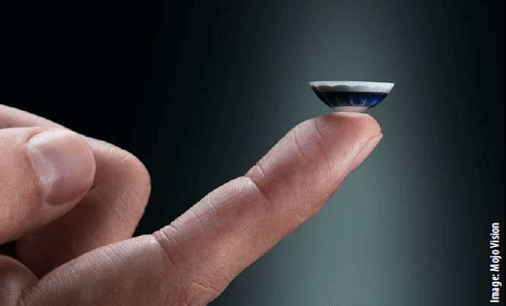 Mojo Vision, the California-based
company, which has been quiet
about what it’s been working on for
five years, has finally shared its plan
for the world’s “first true smart contact
lens.” But let’s be clear: This is not a
product you’ll see on store shelves
next autumn. It’s in the research and
development phase —a few years
away from becoming a real product. ...
Mojo Vision is all about “invisible
computing.” The company, whose
founders include industry veterans
from the likes of Apple, Google, Amazon,
and Microsoft, wants to reduce
our reliance on screens. Instead of
pulling out your phone to check why
it buzzed in the middle of a conversation,
look to the corner of your eye to
activate an interface that will tell you
in a split second.
“We want to create a technology
that lets you be you, lets you look like
you; doesn’t change your appearance;
it doesn’t make you act weird walking
down the street,” said Mike Wiemer,
cofounder and chief technology officer
at Mojo Vision. “It’s very discreet and
frankly, substantially, most of the time
it doesn’t show you anything.” ...
At the moment, the lens receives
power via a wearable you wear on
your wrist, which also handles much
of the computing. Eventually, Wiemer
said, he thinks the team might drop
the wearable in favor of a smartphonebased
solution. ...
Mojo Vision, the California-based
company, which has been quiet
about what it’s been working on for
five years, has finally shared its plan
for the world’s “first true smart contact
lens.” But let’s be clear: This is not a
product you’ll see on store shelves
next autumn. It’s in the research and
development phase —a few years
away from becoming a real product. ...
Mojo Vision is all about “invisible
computing.” The company, whose
founders include industry veterans
from the likes of Apple, Google, Amazon,
and Microsoft, wants to reduce
our reliance on screens. Instead of
pulling out your phone to check why
it buzzed in the middle of a conversation,
look to the corner of your eye to
activate an interface that will tell you
in a split second.
“We want to create a technology
that lets you be you, lets you look like
you; doesn’t change your appearance;
it doesn’t make you act weird walking
down the street,” said Mike Wiemer,
cofounder and chief technology officer
at Mojo Vision. “It’s very discreet and
frankly, substantially, most of the time
it doesn’t show you anything.” ...
At the moment, the lens receives
power via a wearable you wear on
your wrist, which also handles much
of the computing. Eventually, Wiemer
said, he thinks the team might drop
the wearable in favor of a smartphonebased
solution. ...
 NBC News reported that the
Olympic Village [Tokyo 2020]
will be offering over 18,000 beds
with the frames made entirely out of
cardboard to athletes competing in the
Games. After the event, the cardboard
will be recycled into paper products.
The beds are built in line with the
sustainability concept of the Tokyo
Games: “Be better, together —For the
planet and the people.” The organizers
teamed up with the Tokyo Metropolitan
Government and the Government
of Japan to ensure zero waste throughout
the event. ... General manager of
the Athletes Village Takashi Kitajima
reassures with The Associated
Press that the beds are “stronger than
wooden beds.”
NBC News reported that the
Olympic Village [Tokyo 2020]
will be offering over 18,000 beds
with the frames made entirely out of
cardboard to athletes competing in the
Games. After the event, the cardboard
will be recycled into paper products.
The beds are built in line with the
sustainability concept of the Tokyo
Games: “Be better, together —For the
planet and the people.” The organizers
teamed up with the Tokyo Metropolitan
Government and the Government
of Japan to ensure zero waste throughout
the event. ... General manager of
the Athletes Village Takashi Kitajima
reassures with The Associated
Press that the beds are “stronger than
wooden beds.”
 Over 100 Australian architecture
studios have formed an organisation
which will provide pro-bono
design services to people affected by
Australia’s bushfire crisis.
Architects Assist will offer free
design and planning assistance to help
people “rebuild their lives” in the wake
of the massive fires, which have been
blazing across Australia since September
2019. The initiative was established
by architect Jiri Lev, founder of Australian
studio Atelier Jiri Lev, in light of
“the growing scale of the disaster” that
has escalated in the last week with a
number of towns being evacuated.
Lev believes that individual action
will not be sufficient in providing disaster relief to those impacted by
the crisis, and therefore is inviting
architects to come together to make
an impact. “There are many generous
people in architecture always willing
to help,” Lev told Dezeen. “Though
the resources of individual firms are
naturally somewhat limited, both in
acquisition and delivery of pro bono
work,” he explained. “Further, some
geographic areas have few architects
whilst others are supersaturated to an
extent where multiple simultaneous
efforts may overlap or conflict. A joint
referral and coordination platform
appears to be the natural outcome.” ...
Over 100 Australian architecture
studios have formed an organisation
which will provide pro-bono
design services to people affected by
Australia’s bushfire crisis.
Architects Assist will offer free
design and planning assistance to help
people “rebuild their lives” in the wake
of the massive fires, which have been
blazing across Australia since September
2019. The initiative was established
by architect Jiri Lev, founder of Australian
studio Atelier Jiri Lev, in light of
“the growing scale of the disaster” that
has escalated in the last week with a
number of towns being evacuated.
Lev believes that individual action
will not be sufficient in providing disaster relief to those impacted by
the crisis, and therefore is inviting
architects to come together to make
an impact. “There are many generous
people in architecture always willing
to help,” Lev told Dezeen. “Though
the resources of individual firms are
naturally somewhat limited, both in
acquisition and delivery of pro bono
work,” he explained. “Further, some
geographic areas have few architects
whilst others are supersaturated to an
extent where multiple simultaneous
efforts may overlap or conflict. A joint
referral and coordination platform
appears to be the natural outcome.” ...
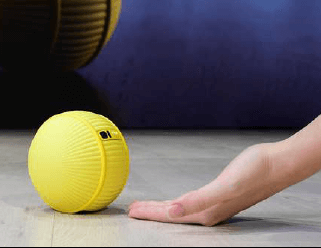 A tiny, ball-shaped AI device that
rolls around the house and responds
to commands like a pet dog is
being mocked by readers [of Dezeen].
They think its creator, Samsung, could
have assigned its designers more useful
work.
“Surely in this world, such bright
minds can be put to better use? Sadly
it’ll sell” said Bloody Fed Up.
“Is it going to make us more human?”
asked Nicholas Renard. “Oh,
sorry, I constantly forget that humanity
is not what the future is about.”
“Can it call an ambulance when
I step on it and wipe out?” queried
James.
“Such a sophisticated chew toy,”
added Cathanina Missick. ...
A tiny, ball-shaped AI device that
rolls around the house and responds
to commands like a pet dog is
being mocked by readers [of Dezeen].
They think its creator, Samsung, could
have assigned its designers more useful
work.
“Surely in this world, such bright
minds can be put to better use? Sadly
it’ll sell” said Bloody Fed Up.
“Is it going to make us more human?”
asked Nicholas Renard. “Oh,
sorry, I constantly forget that humanity
is not what the future is about.”
“Can it call an ambulance when
I step on it and wipe out?” queried
James.
“Such a sophisticated chew toy,”
added Cathanina Missick. ...
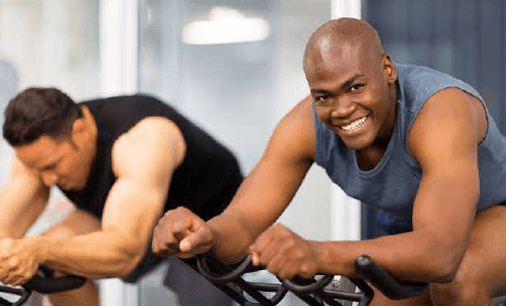 Study after study reminds us that as
challenging as it can be, sticking
with healthy habits —eating right, exercising
regularly, not smoking, maintaining
a healthy weight, and controlling
how much alcohol you drink— can help
us to live longer. But tacking on extra
years isn’t so appealing if some or most
of them are riddled with heart disease,
diabetes or cancer.
In a 2018 study, an international
group of researchers led by scientists
at Harvard T.H. Chan School of Public
Health found that adopting five healthy
habits could extend life expectancy by
14 years for women and by 12 years for
men: 1 Eating a diet high in plants and
low in fats. 2 Exercising at a moderate
to vigorous level for several hours
a week. 3 Maintaining a healthy body
weight. 4 Not smoking. 5 Consuming
no more than one alcoholic drink a day
for women and two for men.
To follow up on that data, the researchers
wanted to know how many
of those added years were healthy
ones, free of three common chronic
diseases: heart disease, type 2 diabetes
and cancer. And in a study published
Jan. 8 in BMJ, they report that a healthy
lifestyle can indeed contribute to more
—and more disease-free— years of life.
The results suggest that women can
extend their disease-free life expectancy
after age 50 by about 10 years,
and men can add about eight years
more, than people who don’t have
these habits. ...
Study after study reminds us that as
challenging as it can be, sticking
with healthy habits —eating right, exercising
regularly, not smoking, maintaining
a healthy weight, and controlling
how much alcohol you drink— can help
us to live longer. But tacking on extra
years isn’t so appealing if some or most
of them are riddled with heart disease,
diabetes or cancer.
In a 2018 study, an international
group of researchers led by scientists
at Harvard T.H. Chan School of Public
Health found that adopting five healthy
habits could extend life expectancy by
14 years for women and by 12 years for
men: 1 Eating a diet high in plants and
low in fats. 2 Exercising at a moderate
to vigorous level for several hours
a week. 3 Maintaining a healthy body
weight. 4 Not smoking. 5 Consuming
no more than one alcoholic drink a day
for women and two for men.
To follow up on that data, the researchers
wanted to know how many
of those added years were healthy
ones, free of three common chronic
diseases: heart disease, type 2 diabetes
and cancer. And in a study published
Jan. 8 in BMJ, they report that a healthy
lifestyle can indeed contribute to more
—and more disease-free— years of life.
The results suggest that women can
extend their disease-free life expectancy
after age 50 by about 10 years,
and men can add about eight years
more, than people who don’t have
these habits. ...
 1 Dig deep. Just like much of the
useless stuff in our homes winds
up at the bottom of boxes and in the
back of closets, so our negative feelings
wind up buried deep in our psyche.
Intentionally spend some time to go
through old memories that you might
usually try to avoid. If it helps, go to a
quiet place to do this emotional work.
2 Write it down. You don’t have to
write a book, but write down everything
that you need to purge. Make
a list of people and things that have
upset you. Make a list of your own
mistakes. You’ll need this list for the
remaining steps.
3 Forgive others. Work your way
down your list and verbally forgive
each person who hurt you. They don’t
have to know you’re forgiving them.
They don’t even have to be living.
4 Forgive yourself. Face it. We all
do stupid shit. We’re human. Make
sure to include your own mistakes and
misgivings on your list. Verbally forgive
yourself for every stupid thing.
5 Throw it away. There are many
ways you can proceed: Go somewhere
and release all the crap. You
might go to the top of a mountain. You
might go to the ocean. You might go to
the fire pit in your backyard. Crumple
it, crush it into the ground, tear it into
little pieces, bury it in the ground, burn
it. Then, scream out loud, “I’m free!” ...
Read full text:
1 Dig deep. Just like much of the
useless stuff in our homes winds
up at the bottom of boxes and in the
back of closets, so our negative feelings
wind up buried deep in our psyche.
Intentionally spend some time to go
through old memories that you might
usually try to avoid. If it helps, go to a
quiet place to do this emotional work.
2 Write it down. You don’t have to
write a book, but write down everything
that you need to purge. Make
a list of people and things that have
upset you. Make a list of your own
mistakes. You’ll need this list for the
remaining steps.
3 Forgive others. Work your way
down your list and verbally forgive
each person who hurt you. They don’t
have to know you’re forgiving them.
They don’t even have to be living.
4 Forgive yourself. Face it. We all
do stupid shit. We’re human. Make
sure to include your own mistakes and
misgivings on your list. Verbally forgive
yourself for every stupid thing.
5 Throw it away. There are many
ways you can proceed: Go somewhere
and release all the crap. You
might go to the top of a mountain. You
might go to the ocean. You might go to
the fire pit in your backyard. Crumple
it, crush it into the ground, tear it into
little pieces, bury it in the ground, burn
it. Then, scream out loud, “I’m free!” ...
Read full text:
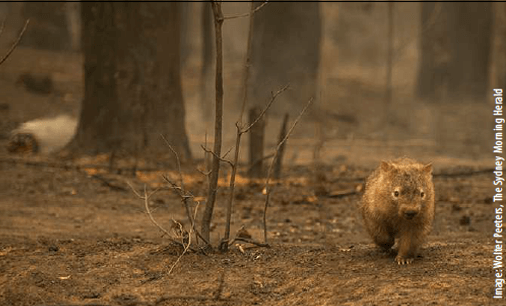
 The timing of Norway’s biggest
oil project in decades is a bit
awkward. Equinor ASA kicked off its
massive Johan Sverdrup field, a rare
mega-project in the aging North Sea,
at a moment where the pressure on
the oil industry and governments
to act against the climate crisis has
never been greater. The field is set
to produce crude for 50 years, well
beyond the time where the world’s
greenhouse-gas emissions should be
net zero to avoid warming of more
than 1.5 degrees.
“It’s understandable that it could
be viewed as a paradox in times like
these,” said economics professor Klaus
Mohn, the rector of the University of
Stavanger, the country’s oil capital.
“But Norway has stubbornly maintained
a separation between its oil
policy on one side and climate policy
on the other.” ...
Equinor anticipated the apparent
contradiction on its website, with the
main banner reading: “We’re celebrating
the opening of the Johan Sverdrup
oil field. But what about the climate?”
The platforms will receive electricity
from Norway’s onshore grid, dominated
by hydropower, meaning each
barrel of oil will generate 0.67 kilos
of carbon dioxide in the production
phase, compared to averages of about
9kg in Norway and 18kg globally. ...
Read full text:
The timing of Norway’s biggest
oil project in decades is a bit
awkward. Equinor ASA kicked off its
massive Johan Sverdrup field, a rare
mega-project in the aging North Sea,
at a moment where the pressure on
the oil industry and governments
to act against the climate crisis has
never been greater. The field is set
to produce crude for 50 years, well
beyond the time where the world’s
greenhouse-gas emissions should be
net zero to avoid warming of more
than 1.5 degrees.
“It’s understandable that it could
be viewed as a paradox in times like
these,” said economics professor Klaus
Mohn, the rector of the University of
Stavanger, the country’s oil capital.
“But Norway has stubbornly maintained
a separation between its oil
policy on one side and climate policy
on the other.” ...
Equinor anticipated the apparent
contradiction on its website, with the
main banner reading: “We’re celebrating
the opening of the Johan Sverdrup
oil field. But what about the climate?”
The platforms will receive electricity
from Norway’s onshore grid, dominated
by hydropower, meaning each
barrel of oil will generate 0.67 kilos
of carbon dioxide in the production
phase, compared to averages of about
9kg in Norway and 18kg globally. ...
Read full text:
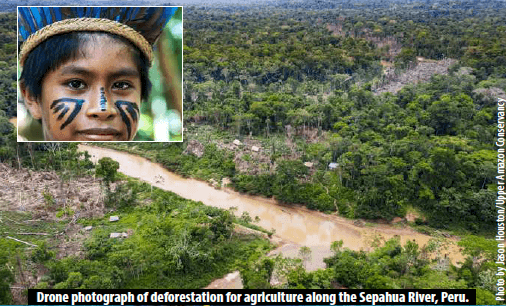 A remote region of the Peruvian
Amazon is being invaded by farmers
who are rapidly clearing mature
forests for farms to grow coca. The
invasions are occurring in the buffer
zone of Alto Purús National Park and
two reserves for isolated tribes, seriously
threatening the Mashco-Piro,
Peru’s largest isolated tribe.
The farmers are from VRAEM, Peru’s
largest cocaine-producing region,
and are part of a growing movement
of coca farmers from the Andean
foothills to biologically and culturally
sensitive lowlands near protected
areas. The invasions are occurring in
timber concessions and exemplify the
problem with Peru’s reliance on timber
companies to properly manage remote
forests lacking state presence. ... Read
full text: https://news.mongabay.com/2019/12/cocafarms-
close-in-on-protected-areas-isolated-tribesin-
peruvian-amazon/
If these farmers are not stopped,
there are sure to be clashes between
farmers and indigenous tribes. And if
history tells us anything, confrontations
between miners, farmers, and
indigenous people only end one way
—with the murder of native peoples. ...
Ask the Peruvian government to step
in and stop the encroachment of coca
farmers into the Alto Purús National
Park.
Please sign the petition:
A remote region of the Peruvian
Amazon is being invaded by farmers
who are rapidly clearing mature
forests for farms to grow coca. The
invasions are occurring in the buffer
zone of Alto Purús National Park and
two reserves for isolated tribes, seriously
threatening the Mashco-Piro,
Peru’s largest isolated tribe.
The farmers are from VRAEM, Peru’s
largest cocaine-producing region,
and are part of a growing movement
of coca farmers from the Andean
foothills to biologically and culturally
sensitive lowlands near protected
areas. The invasions are occurring in
timber concessions and exemplify the
problem with Peru’s reliance on timber
companies to properly manage remote
forests lacking state presence. ... Read
full text: https://news.mongabay.com/2019/12/cocafarms-
close-in-on-protected-areas-isolated-tribesin-
peruvian-amazon/
If these farmers are not stopped,
there are sure to be clashes between
farmers and indigenous tribes. And if
history tells us anything, confrontations
between miners, farmers, and
indigenous people only end one way
—with the murder of native peoples. ...
Ask the Peruvian government to step
in and stop the encroachment of coca
farmers into the Alto Purús National
Park.
Please sign the petition:
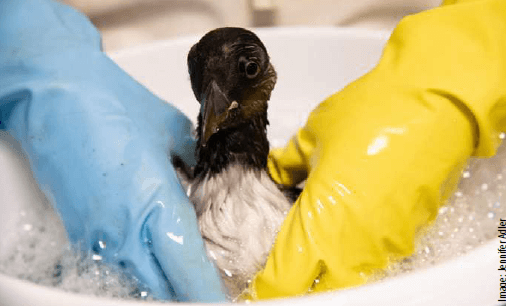 September is a time of little sleep
for Sandra Sif Sigvardsdóttir. “It’s
puffling season,” she says. “I’ll sleep
in November.” ... [She and her sister
Sandra] are part of the Puffling Patrol
(Pysjueftirlitið), an island-wide volunteer
rescue program launched in 2003.
Puffins have traditionally been
hunted for food in Iceland —and still
are. But in the Westman Islands, residents’
relationship with these iconic
birds is changing. On Heimaey, a centuries-
long tradition of hunting puffins
has shifted to a culture of conservation.
There are an estimated 870,000
breeding pairs of Atlantic puffins in
the Westman Islands, but they are
listed as “vulnerable” on the IUCN Red List of Threatened Species —meaning
they are at high risk of extinction.
The population in Iceland declined by
45.6% between 2003 and 2017, according
to Erpur Snær Hansen, director
of ecological research at Náttúrustofa
Suðurlands (South Iceland Nature
Research Center).
Experts say this is due to a mix of
factors including hunting, overfishing
and pollution —but perhaps the
most important is climate change.
Warming ocean temperatures have
reduced puffin numbers “tremendously
fast,” mainly by reducing their
prey, says Hansen. ...
Read full text:
September is a time of little sleep
for Sandra Sif Sigvardsdóttir. “It’s
puffling season,” she says. “I’ll sleep
in November.” ... [She and her sister
Sandra] are part of the Puffling Patrol
(Pysjueftirlitið), an island-wide volunteer
rescue program launched in 2003.
Puffins have traditionally been
hunted for food in Iceland —and still
are. But in the Westman Islands, residents’
relationship with these iconic
birds is changing. On Heimaey, a centuries-
long tradition of hunting puffins
has shifted to a culture of conservation.
There are an estimated 870,000
breeding pairs of Atlantic puffins in
the Westman Islands, but they are
listed as “vulnerable” on the IUCN Red List of Threatened Species —meaning
they are at high risk of extinction.
The population in Iceland declined by
45.6% between 2003 and 2017, according
to Erpur Snær Hansen, director
of ecological research at Náttúrustofa
Suðurlands (South Iceland Nature
Research Center).
Experts say this is due to a mix of
factors including hunting, overfishing
and pollution —but perhaps the
most important is climate change.
Warming ocean temperatures have
reduced puffin numbers “tremendously
fast,” mainly by reducing their
prey, says Hansen. ...
Read full text:

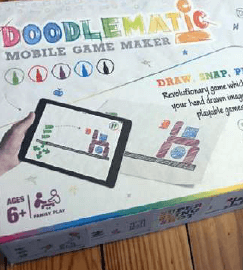 Step 1: Use the colors
and draw your game level! Step 2: Take a
photo of your game in the Doodlematic
app! Step 3: Play your game (and share it
on social media!) doodlematic.com
Step 1: Use the colors
and draw your game level! Step 2: Take a
photo of your game in the Doodlematic
app! Step 3: Play your game (and share it
on social media!) doodlematic.com
 Writes
and erases in four colors on any vertical
surface —whiteboard, glass or standard
plaster— and erases on drywalls
and standard plaster. store.moma.org
Writes
and erases in four colors on any vertical
surface —whiteboard, glass or standard
plaster— and erases on drywalls
and standard plaster. store.moma.org
 The LEDs create animation displays that take over
the entire back of the helmet. When you turn, impossible-to-miss arrows progress
from one side of the helmet to the other. As you signal that you’re braking, the
entire back of the helmet lights up in red like a car’s tail lights. store.moma.org
The LEDs create animation displays that take over
the entire back of the helmet. When you turn, impossible-to-miss arrows progress
from one side of the helmet to the other. As you signal that you’re braking, the
entire back of the helmet lights up in red like a car’s tail lights. store.moma.org
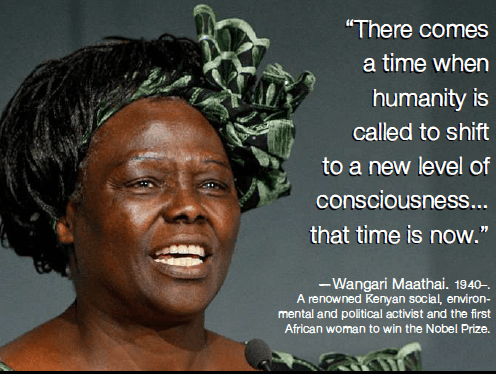
 The Bachelor of Teaching Methodology
(B.Ed, BS) program objective
is to prepare highly qualified teachers
with the knowledge, disposition, and
skills that support standards-based
education, student-centered teaching
and learning, and an orientation to social
education. The Bachelor of Teaching
Methodology (B.Ed, BS) program
is offered online via distance learning.
After evaluating both academic record
and life experience, AIU staff working
in conjunction with Faculty and
Academic Advisors will assist students
in setting up a custom-made program,
designed on an individual basis. This
flexibility to meet student needs is seldom found in other distance learning
programs. Our online program
does not require all students to take
the same subjects/courses, use the
same books, or learning materials. Instead,
the online Bachelor of Teaching
Methodology (B.Ed, BS) curriculum is
designed individually by the student
and academic advisor.
It specifically addresses strengths
and weaknesses with respect to
market opportunities in the student’s
major and intended field of work.
Understanding that industry and
geographic factors should influence
the content of the curriculum instead
of a standardized one-fits-all design is
the hallmark of AIU’s unique approach
to adult education. This philosophy
addresses the dynamic and constantly
changing environment of working
professionals by helping adult students
in reaching their professional
and personal goals within the scope of
the degree program..
The Bachelor of Teaching Methodology
(B.Ed, BS) program objective
is to prepare highly qualified teachers
with the knowledge, disposition, and
skills that support standards-based
education, student-centered teaching
and learning, and an orientation to social
education. The Bachelor of Teaching
Methodology (B.Ed, BS) program
is offered online via distance learning.
After evaluating both academic record
and life experience, AIU staff working
in conjunction with Faculty and
Academic Advisors will assist students
in setting up a custom-made program,
designed on an individual basis. This
flexibility to meet student needs is seldom found in other distance learning
programs. Our online program
does not require all students to take
the same subjects/courses, use the
same books, or learning materials. Instead,
the online Bachelor of Teaching
Methodology (B.Ed, BS) curriculum is
designed individually by the student
and academic advisor.
It specifically addresses strengths
and weaknesses with respect to
market opportunities in the student’s
major and intended field of work.
Understanding that industry and
geographic factors should influence
the content of the curriculum instead
of a standardized one-fits-all design is
the hallmark of AIU’s unique approach
to adult education. This philosophy
addresses the dynamic and constantly
changing environment of working
professionals by helping adult students
in reaching their professional
and personal goals within the scope of
the degree program..
 Atlantic International University is accredited by the Accreditation Service for International
Schools, Colleges and Universities (ASIC). ASIC Accreditation is an internationally
renowned quality standard for colleges and universities. Visit ASIC’s Directory of Accredited
Colleges and Universities. ASIC is a member of CHEA International Quality Group
(CIQG) in the USA, an approved accreditation body by the Ministerial Department of the Home Office
in the UK, and is listed in the International Directory of the Council for Higher Education Accreditation
(CHEA). The University is based in the United States and was established by corporate charter in 1998.
Atlantic International University is accredited by the Accreditation Service for International
Schools, Colleges and Universities (ASIC). ASIC Accreditation is an internationally
renowned quality standard for colleges and universities. Visit ASIC’s Directory of Accredited
Colleges and Universities. ASIC is a member of CHEA International Quality Group
(CIQG) in the USA, an approved accreditation body by the Ministerial Department of the Home Office
in the UK, and is listed in the International Directory of the Council for Higher Education Accreditation
(CHEA). The University is based in the United States and was established by corporate charter in 1998.
 In some cases, accredited colleges
may not accept for transfer courses and degrees
completed at unaccredited colleges, and some
employers may require an accredited degree as
a basis for eligibility for employment. Potential
students should consider how the above may affect
their interests, AIU respects the unique rules and
regulations of each country and does not seek to
influence the respective authorities. In the event
that a prospective student wishes to carry out any
government review or process in regards to his
university degree, we recommend that the requirements
of such are explored in detail with the relevant
authorities by the prospective student as the
university does not intervene in such processes.
AIU students can be found in over 180 countries,
they actively participate and volunteer
in their communities as part of their academic
program and have allocated thousands of service
hours to diverse causes and initiatives. AIU
programs follow the standards commonly used by
colleges and universities in the United States with
regards to the following: academic program
structure, degree issued, transcript, and
other graduation documents.
AIU graduation documents can include
an apostille and authentication from the
US Department of State to facilitate their
use internationally.
In some cases, accredited colleges
may not accept for transfer courses and degrees
completed at unaccredited colleges, and some
employers may require an accredited degree as
a basis for eligibility for employment. Potential
students should consider how the above may affect
their interests, AIU respects the unique rules and
regulations of each country and does not seek to
influence the respective authorities. In the event
that a prospective student wishes to carry out any
government review or process in regards to his
university degree, we recommend that the requirements
of such are explored in detail with the relevant
authorities by the prospective student as the
university does not intervene in such processes.
AIU students can be found in over 180 countries,
they actively participate and volunteer
in their communities as part of their academic
program and have allocated thousands of service
hours to diverse causes and initiatives. AIU
programs follow the standards commonly used by
colleges and universities in the United States with
regards to the following: academic program
structure, degree issued, transcript, and
other graduation documents.
AIU graduation documents can include
an apostille and authentication from the
US Department of State to facilitate their
use internationally.
 The School of Business and Economics
allows aspiring and practicing
professionals, managers, and entrepreneurs
in the private and public sectors
to complete a self paced distance
learning degree program of the highest
academic standard.
The ultimate goal is to empower
learners and help them take advantage
of the enormous array of resources
from the world environment in order
to eliminate the current continuum of
poverty and limitations.
Degree programs are designed for
those students whose professional experience has been in business,
marketing, administration, economics,
finance and management.
The School of Business and Economics
allows aspiring and practicing
professionals, managers, and entrepreneurs
in the private and public sectors
to complete a self paced distance
learning degree program of the highest
academic standard.
The ultimate goal is to empower
learners and help them take advantage
of the enormous array of resources
from the world environment in order
to eliminate the current continuum of
poverty and limitations.
Degree programs are designed for
those students whose professional experience has been in business,
marketing, administration, economics,
finance and management.
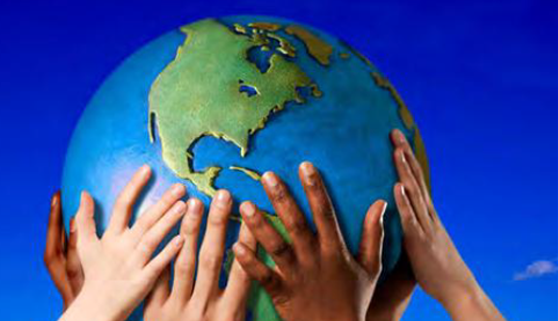 The School of Social and Human Studies
is focused on to the development of
studies which instill a core commitment
to building a society based on social and
economic justice and enhancing opportunities
for human well being.
The founding principles lie on the
basic right of education as outlined
in the Declaration of Human Rights.
We instill in our students a sense of
confidence and self reliance in their
ability to access the vast opportunities
available through information channels,
the world wide web, private, public,
nonprofit, and nongovernmental organizations in an ever expanding
global community.
Degree programs are aimed towards
those whose professional life has been
related to social and human behavior,
with the arts, or with cultural studies.
The School of Social and Human Studies
is focused on to the development of
studies which instill a core commitment
to building a society based on social and
economic justice and enhancing opportunities
for human well being.
The founding principles lie on the
basic right of education as outlined
in the Declaration of Human Rights.
We instill in our students a sense of
confidence and self reliance in their
ability to access the vast opportunities
available through information channels,
the world wide web, private, public,
nonprofit, and nongovernmental organizations in an ever expanding
global community.
Degree programs are aimed towards
those whose professional life has been
related to social and human behavior,
with the arts, or with cultural studies.
 The School of Science and Engineering
seeks to provide dynamic, integrated,
and challenging degree programs
designed for those whose experience
is in industrial research, scientific production,
engineering and the general
sciences. Our system for research and
education will keep us apace with the
twenty-first century reach scientific
advance in an environmentally and
ecologically responsible manner to allow
for the sustainability of the human
population. We will foster among our
students a demand for ethical behavior,
an appreciation for diversity, an understanding
of scientific investigation, knowledge of design innovation, a
critical appreciation for the importance
of technology and technological change
for the advancement of humanity.
The School of Science and Engineering
seeks to provide dynamic, integrated,
and challenging degree programs
designed for those whose experience
is in industrial research, scientific production,
engineering and the general
sciences. Our system for research and
education will keep us apace with the
twenty-first century reach scientific
advance in an environmentally and
ecologically responsible manner to allow
for the sustainability of the human
population. We will foster among our
students a demand for ethical behavior,
an appreciation for diversity, an understanding
of scientific investigation, knowledge of design innovation, a
critical appreciation for the importance
of technology and technological change
for the advancement of humanity.
 With access to a global catalog created and maintained collectively by more than
9,000 participating institutions, AIU students have secured excellent research
tools for their study programs.
With access to a global catalog created and maintained collectively by more than
9,000 participating institutions, AIU students have secured excellent research
tools for their study programs.